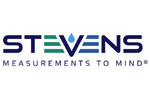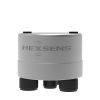Stevens HydraProbe Soil Moisture Sensors
Features
- Instantaneous sensor response with no calibration requirements
- Compact, rugged, zero-maintenance design for long-term deployments
- Easy integration with NexSens data logging & telemetry products
- Free ground shipping
- Expedited repair and warranty service
- Lifetime technical support
- More
Overview
The Stevens Hydraprobe measures 21 different soil parameters simultaneously. The HydraProbe instantly calculates soil moisture, electrical conductivity, salinity, and temperature and supplies raw voltages and complex permittivity for research applications. A compact, rugged design with potted internal components makes the HydraProbe easy to deploy and leave in the soil for years without maintenance.
Electrical Response Parameters
The Stevens HydraProbe design is unique compared to other soil moisture probes because the electrical response of soils can be specified by two parameters - the dielectric constant and the conductivity. The dielectric constant is most indicative of water content, while the conductivity is strongly dependent on soil salinity. Unlike other capacitance-type sensors, the HydraProbe measures both of these components simultaneously. The high-frequency electrical measurements indicating the capacitive and conductive properties of soil are then directly related to the soil's moisture and salinity content, while a thermistor determines soil temperature.
Remote Capabilities
The HydraProbe soil moisture sensor includes SDI-12 or RS-485 outputs for interfacing with external data loggers such as the NexSens X3. Sensor cables can be factory-connected with NexSens UW plug connectors for integration to an X3 data logger sensor port. Data retrieval options using the X3 include direct-connect, Wi-Fi, cellular, and Iridium satellite telemetry.
In The News
From Paddles to Phytoplankton: Studying Vermont’s Wildest Lakes
For six months of the year, Rachel Cray, a third-year PhD student at the Vermont Limnology Laboratory at the University of Vermont, lives between a microscope and her laptop, running data. For the other six months, she is hiking and canoeing four of Vermont’s lakes, collecting bi-weekly water samples. Cray studies algal phenology across four lakes in Vermont, US, that have low anthropogenic stress—or in other words, are very remote. Funded by the National Science Foundation Career Award to Dr. Mindy Morales, the lakes Cray researches part of the Vermont Sentinel Lakes Program, which studies 13 lakes in the area and, in turn, feeds into the Regional Monitoring Network, which operates in the Northeast and Midwest US.
Read MoreReimagining Water Filtration: How Monitoring and Science Enhance FloWater Filtration Systems
Over 50% of Americans think their tap water is unsafe , according to the Environmental Working Group (EWG). Other recent surveys have found that number to be as high as 70% of persons surveyed. Whether due to increased public awareness of water quality issues or confusion about how municipal water sources are regulated, there is a clear distrust of tap water in the United States. According to industry expert Rich Razgaitis, CEO and co-founder of the water purification company FloWater, this issue creates a damaging cycle. Razgaitis explained that the health and environmental problems associated with contaminated water aren’t the only issues. As people become increasingly aware that some tap water is unsafe, they resort to bottled water.
Read MoreMonitoring New Hampshire’s Aquatic Ecosystems: Continuous Data Collection in the Lamprey River Watershed
New Hampshire’s aquatic ecosystems provide a range of ecosystem services to the state and region. Resources and services like clean water, carbon storage, climate regulation, nutrient regulation, and opportunities for recreation all depend on New Hampshire’s aquatic ecosystems remaining healthy. Jody Potter, an analytical instrumentation scientist at the University of New Hampshire (UNH), is studying these aquatic ecosystems in hopes of developing an improved understanding of ecosystem services and their interactions with climate change, climate variability, and land use changes. [caption id="attachment_39799" align="alignnone" width="940"] Aquatic sensors in the Merrimack River in Bedford, NH, with I-293 in the background.
Read More















